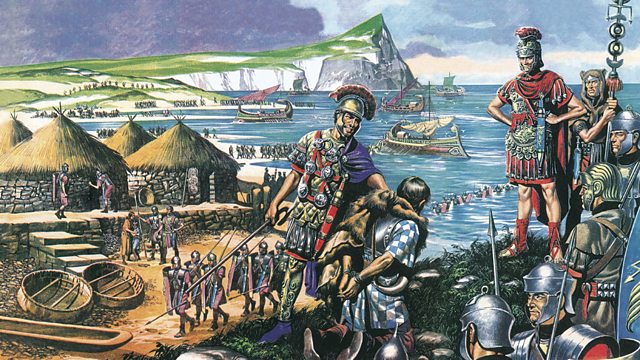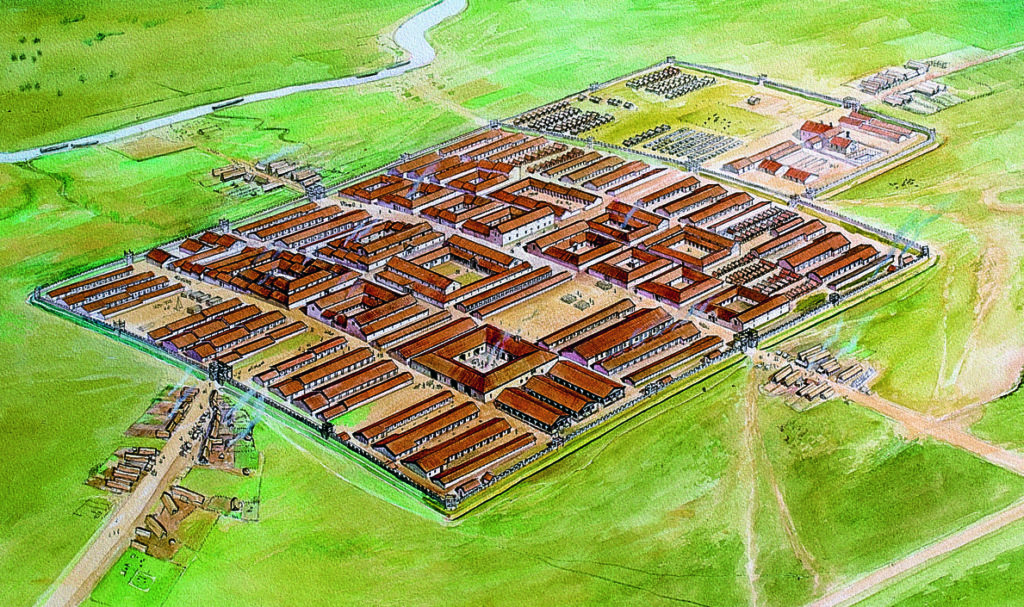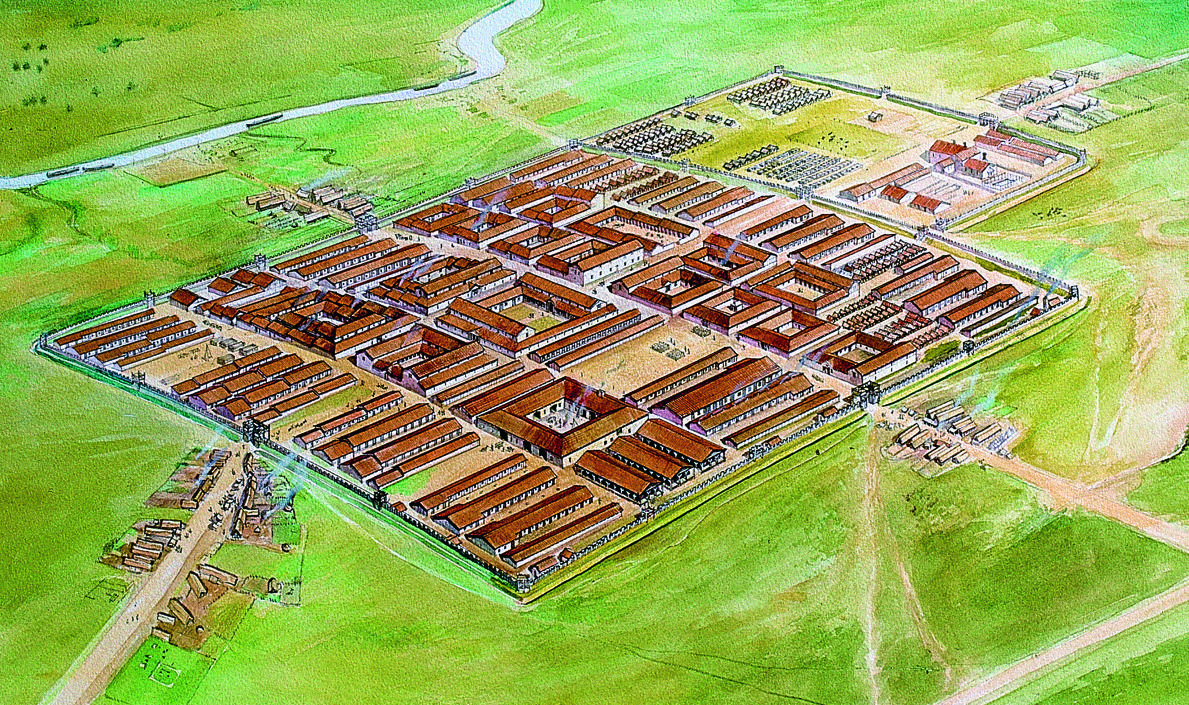The Romans had an enormous impact on the Arthurian legends. Not only do they appear in the legends themselves, but their historical actions are intimately connected to what occurred in Arthur’s time. For that reason, it is certainly worth examining this nation in closer detail.
Their Origin
The Romans were Latins (an Italic tribe) who lived in Rome, a city in central Italy. This city was supposedly founded in 753 B.C.E. There are a number of different legends about how this founding took place. The most famous is that it was founded by Romulus, from whom the city was said to have received its name.
Another legend was that Trojan refugees arrived in the area after the fall of Troy (traditionally dated to about 1200 B.C.E.), led by a prince named Aeneas. These Trojans then founded the city of Rome. Some Roman writers attempted to harmonise this legend with the previously-mentioned one by claiming that Romulus was from the city that the Trojans refugees founded centuries earlier, but that he then founded Rome itself in the eighth century.
There are other legends as well, but these are the two most famous ones. Whether the attempted harmonisation by Roman writers is correct, or whether just one of them has any basis in reality, is impossible to state with certainty.
What is known, however, is that the Etruscans were closely connected to the founding of the city. They were neighbours of the Latins, and some of the earliest kings of Rome were Etruscan. Given the likely connection between the Etruscans and the Trojans (for example, Aeneas was said to have arrived in Italy with an Etruscan leader, and the Etruscans are generally believed by modern scholars to have come from western Turkey, like the Trojans), it seems quite likely that there is some degree of truth to the story of Aeneas and the Trojan refugees arriving in Italy and having a hand in the establishment of Rome.
In any case, the line of Roman kings came to an end in the late sixth century. From that point on, Rome was a republic, governed by consuls. This status continued for many centuries.
Later Development
 As time went on, the Romans expanded their influence. They steadily grew in power, so that by the final few centuries of the first millennium B.C.E., they had become a force to be reckoned with. Other nations started to turn to them for help, such as the Ptolemaic dynasty in Egypt.
As time went on, the Romans expanded their influence. They steadily grew in power, so that by the final few centuries of the first millennium B.C.E., they had become a force to be reckoned with. Other nations started to turn to them for help, such as the Ptolemaic dynasty in Egypt.
By the 160s, Rome had expanded its influence as far as the Middle East, dominating Syria and forcing it to submit to Rome’s will. In 146 B.C.E., the Romans finally overthrew the Greeks. At the same time, they began acquiring territory in North Africa. This year really marks the point at which the Romans became the dominant power in that part of the world.
However, the Romans were far from finished in their growth by the year 146. Over the following century, they continued to grow more powerful and acquire more territory. Under the leadership of Julius Caesar, the Romans conquered all of Gaul. Thus, by the time he died, Roman control extended from Syria in the east to Gaul and Spain in the west.
After Julius Caesar’s death, the Republic was ruled by the Second Triumvirate, an alliance between Caesar’s adopted son Octavian, Mark Antony and Marcus Lepidus. Eventually this alliance broke apart, and in 27 B.C.E., Octavian became the first official emperor of the Roman Empire. Around this time, he received the name ‘Augustus’, by which name he is much better known.
The Roman army was famous for its disciplined nature. Their iconic tortoise battle formation in which they arranged themselves in a tightly packed block of soldiers with shields covering them is a perfect example of their orderly mode of combat. This is what made the Roman army such an effective and powerful war machine.
Role in Britain’s History
 During Julius Caesar’s reign, Britain was invaded twice by the Romans under that leader’s command. The first attempt, in 55 B.C.E., was very short lived and resulted in the Romans being quickly chased off the island. The second attempt, in the following year, met with much more success. Despite fierce opposition from the Britons, the Romans managed to push their way relatively far into the country.
During Julius Caesar’s reign, Britain was invaded twice by the Romans under that leader’s command. The first attempt, in 55 B.C.E., was very short lived and resulted in the Romans being quickly chased off the island. The second attempt, in the following year, met with much more success. Despite fierce opposition from the Britons, the Romans managed to push their way relatively far into the country.
With the help of British allies, the Romans eventually subdued Cassivellaunus, the main British war-king in opposition to Caesar. However, their position was still not strong or stable enough to dominate the island, so they simply imposed a yearly tribute on the Britons, told Cassivellaunus not to attack the British ruler who was friendly with the Romans, and then left.
It was not until the following century, in the year 43 C.E., that the Romans again invaded Britain. This time, they managed to gain permanent territory in the country. Many tribes quickly submitted to the invaders, while others were forced into submission by the power of the Roman armies. Some areas took a very long time to conquer, but within a matter of decades, the Romans had control of about as much of Britain as they ever did during the Roman era.
The Romans dominated Britain for the next three centuries. During that time, Britain’s relationship with the Roman Empire was not always an easy one. Britain produced quite a number of usurpers, and a few times it broke away from the Empire briefly.
Around the end of the fourth century, the Romans gradually started losing interest in the island. Magnus Maximus withdrew most of the Roman forces from Wales and the north when he became a usurper, and after he was defeated, Rome did not replace those forces. Essentially the same thing took place a few decades later, when a soldier named Constantine was declared Emperor and left Britain for Gaul, taking with him most of the remaining troops.
During his reign, the Roman administration in the island was expelled by the natives, and the Romans never sent troops there again. They abandoned it as lost. It was not necessarily the case that the Romans no longer cared about Britain anymore, but they were too preoccupied with attacks from Germanic tribes in other parts of the Empire to spare the time, energy and manpower to attempt to regain control of it.
This shift in focus was justified, for the Western Roman Empire came to an end less than a century later, in the year 476 C.E., when Emperor Romulus Augustulus was deposed by the Germanic king Odoacer.
Vital to Arthurian History
 But what role do the Romans have to play in the history of King Arthur? Firstly, Roman Britain established the world in which Arthur’s family emerged. Without the Romans dominating Britain for all those centuries, the whole history of the island could well have gone completely differently.
But what role do the Romans have to play in the history of King Arthur? Firstly, Roman Britain established the world in which Arthur’s family emerged. Without the Romans dominating Britain for all those centuries, the whole history of the island could well have gone completely differently.
For example, after the Romans left Britain, the political and military situation was suddenly desperate. The native tribes had not needed to fend for themselves for centuries, since the Roman forces had been present in the island to establish order and peace. There had been no powerful, regional-dominating native kingdoms within Britain, as there had been in the pre-Roman era.
Therefore, when the Romans suddenly left, the Britons found themselves in need of assistance to protect themselves from the Picts and the Scots, who were raiding the shores of the island. This is what led to Vortigern hiring the Anglo-Saxons as mercenaries.
A more detailed explanation is given in the article ‘The Saxon Invasion of Britain’, but in summary, Vortigern’s arrangement with these Germanic mercenaries eventually backfired and resulted in them conquering progressively more and more of the country. By the turn of the sixth century, they had gained control of the south east quarter of Britain, roughly from the Humber in the north east to almost as far west as the Severn in the south west.
It was this world that Arthur was born in to. His role as warrior-king who fought 12 battles against the Saxons and won the decisive victory at Badon is fundamentally rooted in this premise. Without the Saxons being hired as mercenaries, there likely would never have been a Saxon conquest of Britain for Arthur to fight against. And without the Romans having ruled Britain during the previous centuries, the Britons would most probably have never required the assistance of the Saxons.
Even if the Saxons would have eventually been hired anyway by the Britons to defend against Pictish and Scottish pirates, the fact that this took place specifically in the fifth century was determined by the end of Roman-Britain. Without the Romans ruling Britain for a time, this may have happened at any point in history (if it would have happened at all, which is unlikely), potentially centuries removed from Arthur’s lifetime.
So we can see that without the Romans, the backdrop to the Arthurian legends would never have been formed, and so the grains of truth around which the legends formed would have never existed.
Role in the Arthurian Legends
But what about the role of the Romans within the actual tales themselves? Given that the Romans left Britain decades before Arthur’s birth, one would be forgiven for thinking that they would never actually appear in the tales. But yet, the Romans have a very prominent part in the Arthurian legends, particularly from the 12th century onwards.
In Geoffrey of Monmouth’s Historia Regum Britanniae, Arthur is depicted as invading Gaul and fighting a man named Frollo who is described as a Roman tribune. This tribune is defeated, and Arthur takes over Gaul and other territories as well. This, obviously, angers the Romans.
Later, when Arthur is celebrating Pentecost back in Britain, messengers arrive with a letter from a Roman commander named Lucius Tiberius (or ‘Hiberius’ in some manuscripts). This letter condemns Arthur for his actions and insists that the Britons pay tribute to Rome.
Arthur becomes infuriated at this, as do his men, and they decide to set out on a campaign against Rome itself. The Britons meet the Romans under a commander named Petreius, initially without Arthur present, where a skirmish breaks out and a number of Romans are captured.
Later, as Arthur’s army progresses further towards Rome, Lucius Tiberius gathers a large army of many nations around the Mediterranean. The Romans and their allies set out to defeat Arthur, and they meet his army at a valley called Siesia. It is a very bloody battle, but the Romans are eventually overcome by the Britons.
In this version of the story, Arthur never arrives at Rome itself, for he has to turn back and defeat his usurping nephew Mordred in Britain. However, in later versions of this tale, Arthur is portrayed as getting to Rome and actually being crowned as emperor.
Whether this story has any basis in reality is something that has been debated for years. Given that the Romans did not actually control Gaul in the time the story is set, the most common explanation is that it is a misplaced account of an earlier historical event.
One popular suggestion is Riothamus’s incursion into Gaul in 470 to defeat the Visigoths, but this resulted in a defeat for Riothamus and was not a battle against the Romans – it was actually in support of the Romans. Another suggestion is that it comes from Lucius Artorius Castus taking troops from Britain into Armorica, but again, this was not a battle against the Romans. It has also been argued that the true location was Armenia, not anywhere in Gaul.
A more likely explanation is that the story comes from Magnus Maximus’s invasion of Gaul from Britain, the events of which played out quite similarly to the events of the Arthurian story.
So, in reality, it is very unlikely that the historical King Arthur had anything to do with the Romans. Nonetheless, they play a large part in one of the grandest of the Arthurian tales, and their role in establishing the backdrop to the Arthurian era cannot be overstated.
Final Thoughts
In summary, then, the Romans started off as an insignificant tribe of Latins in Italy. They gradually grew more and more powerful, experienced several different forms of government, and eventually created one of the most impressive empires in history and imposed their sovereignty over Britain. This dominion last for centuries, setting the stage for the Arthurian legends.
While not historically interacting with Arthur, the Romans gain a presence in the legends by means of a misplaced (or possibly just fictional) account of a conquest of western Europe, thus having a primary role in one of the grandest events in Arthur’s legendary reign.


